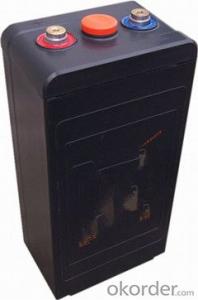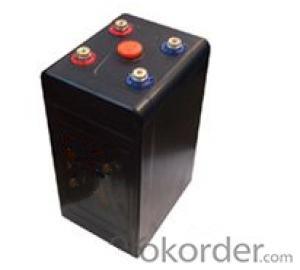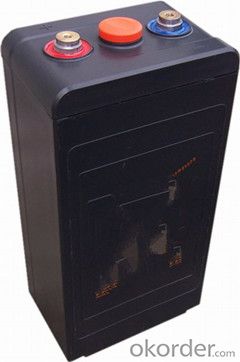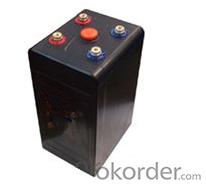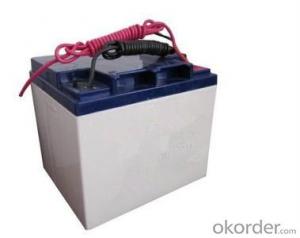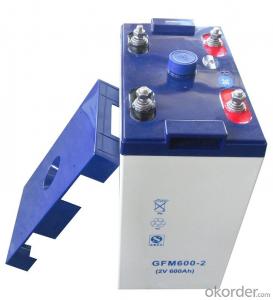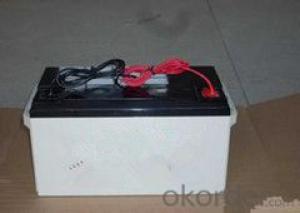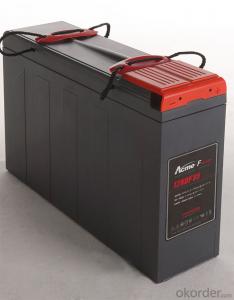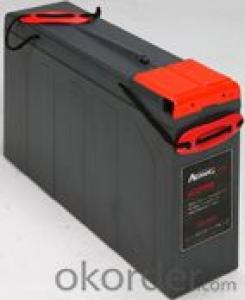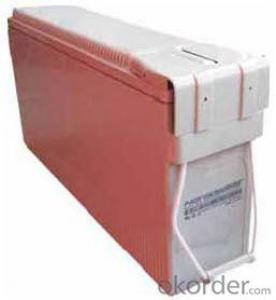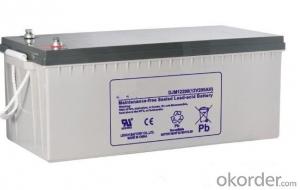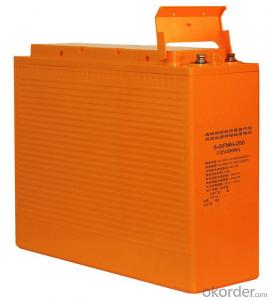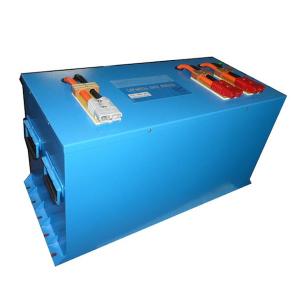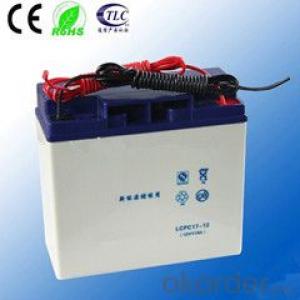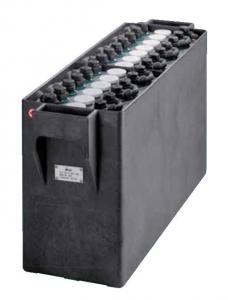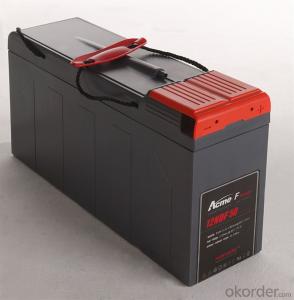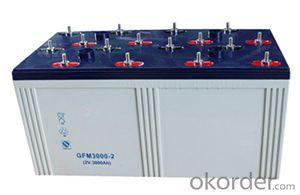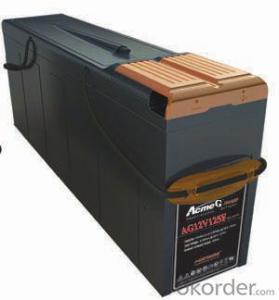battery the EosG series batteries EosG400
- Loading Port:
- Shanghai
- Payment Terms:
- TT OR LC
- Min Order Qty:
- 2000 unit
- Supply Capability:
- 5000000 unit/month
OKorder Service Pledge
OKorder Financial Service
You Might Also Like
Range summary
The EosG range of gel technology batteries offers outstanding performance including a 15+ years design life .
The EosG series batteries is designed based on the Eos series.
Using the polymer gel electrolyte .
Built to the highest standards and compliant with the latest IEC60896-21/22 standard .
This range also offers 100% capacity out-of-the-box and is capable of handling deep discharges for complete peace of mind. The use of flexible connectors and the ability to be installed both horizontally and vertically allows for multiple installation possibilities.
Technical features
Above 15 years designed life
Reliable post sealing structure
Excellent charging acceptant ability
Excellent performance at extreme high and low temperature
Low self-discharge ability
Flexible and convenient installation with slinky outside looking
Type: | EosG400 | |
Voltage: | 2V | |
Nominal Capacity: | 400Ah(C10) | 400Ah(10 hours rate:) |
Length: | 166mm | |
Width: | 184.5mm | |
Height: | 360.5mm | |
Height with termial: | 372mm | |
Weight: | 25Kg |
Compliant standards
IEC60896-21/22
BS6290 part 4
Telcordia SR4228
Eurobat guide
UL
Manufactured under system ISO9001(TUV)
EN 50272-2 or local equivalents
Correspondence exchange and transmission system
Mobile communication system
Power plant and power transformer system
Navigation and signaling system
Solar energy system
Radio and broadcasting station
Emergency lighting system
Plate special patent calcium and tin lead alloy and thick plate design
Container ABS(V0 optional)
Separator AGM
Valve EPDR
Electrolyte using the polymer gel electrolyte
Terminal M8 copper core posts
Battery installation compliant with:
Main applications
Products characteristics:
FAQ
![]() What is sulfation of batteries?
What is sulfation of batteries?
Sulfation is the formation or deposit of lead sulfate on the surface and in the pores of the active material of the batteries' lead plates. If the sulfation becomes excessive and forms large crystals on the plates, the battery will not operate efficiently and may not work at all. Common causes of battery sulfation are standing a long time in a discharged condition, operating at excessive temperatures, and prolonged under or over charging.
![]() How long a battery can last?
How long a battery can last?
The service design life of a battery are vary considerably with how it is used, how it is maintained and charged, temperature, and other factors.
![]() Do batteries self-discharge when not in use?
Do batteries self-discharge when not in use?
All batteries, regardless of their chemistry, self-discharge. The rate of self-discharge depends both on the type of battery and the storage temperature the batteries are exposed to. However, for a good estimate, Narada batteries self-discharge approximately 4% per week at 80ĄăF.
- Q: How to repair the battery?
- Charge the battery at constant voltage. It is the beginning of the time, using 0.1C ~ 0.25C current charge, to 16.2V later, by reducing the current method to maintain the charging voltage, until the charge current drops to 0.03C when the stop charging.
- Q: How is the capacity of the battery defined?
- 100AH capacity of the battery, fully charged after the 100A current discharge can be an hour to put the power finished. 50A current is 2 hours put away! 20A is 5 hours! Of course this is the theoretical value, in fact it is impossible to have a constant current discharge.
- Q: What is the difference between a maintenance-free battery and a conventional battery?
- Different materials will produce a different phenomenon: the traditional battery in the course of the use of the phenomenon of liquid reduction occurs, because the antimony on the grid will pollute the sponge on the negative plate of pure lead, weakened after the full charge of the battery Electromotive force, resulting in excessive decomposition of water, a large number of oxygen and hydrogen, respectively, from the positive and negative plates to escape, so that the electrolyte reduced. With calcium instead of antimony, you can change the fully charged battery back electromotive force, reduce the overcharge current, liquid gasification rate decreases, thereby reducing the loss of electrolyte.
- Q: What are the technical parameters of the battery?
- Usually the capacity of the power supply is expressed by kV · A or kW. However, as a power supply VRLA battery, the use of security (A · h) that its capacity is more accurate.
- Q: How to deal with waste batteries?
- The rest of the various types of waste batteries are generally shipped to a special toxic, hazardous landfill, but this approach not only cost too much but also cause waste, because there are many useful raw materials available.
- Q: What battery does the van use?
- The most obvious feature of lead-acid batteries is the top of the plastic cover can be unscrewed, there are ventilation holes above. These fillers are used to fill pure water, check the electrolyte and the use of exhaust gas. In theory, lead-acid batteries need to check the density of each electrolyte and the level of liquid, if there is a need to add distilled water. But with the upgrading of battery manufacturing technology, lead-acid battery development for the lead-acid maintenance-free batteries and colloidal maintenance-free batteries, lead-acid batteries do not need to add electrolyte or distilled water. Mainly the use of positive electrode to produce oxygen can be absorbed in the negative oxygen cycle, to prevent water reduction. Lead-acid water batteries are mostly used in tractors, tricycles, car start, etc., and maintenance-free lead-acid battery wider range of applications, including uninterruptible power supply, electric vehicle power, electric bicycle batteries. Lead-acid batteries according to the application needs to be divided into constant current discharge (such as uninterruptible power supply) and instantaneous discharge (such as car to start the battery).
- Q: What are the advantages of maintenance-free batteries?
- Maintenance-free battery using lead-calcium alloy grille, the amount of water generated when charging less water evaporation is low, with the shell with a sealed structure, the release of sulfuric acid gas is also very little, so with the above advantages.
- Q: The role of the battery?
- Battery is widely used, can be used for ups, electric cars, scooters, cars, wind energy solar systems, security, and so on.
- Q: What kind of battery is divided into?
- At present, we used the car battery is divided into three categories, namely, ordinary batteries, dry batteries and maintenance-free batteries three.
- Q: Battery 200ah / 104 what does that mean?
- This should be refers to 2V200AH battery 104, power with the 220V. Lead-acid battery nominal voltage is 2V / (each or monomer), but in fact will be higher than 2V, so the actual use and charging equipment for the matching will use 104, also useful 103, also useful 108 Only.
Send your message to us
battery the EosG series batteries EosG400
- Loading Port:
- Shanghai
- Payment Terms:
- TT OR LC
- Min Order Qty:
- 2000 unit
- Supply Capability:
- 5000000 unit/month
OKorder Service Pledge
OKorder Financial Service
Similar products
Hot products
Hot Searches
Related keywords
